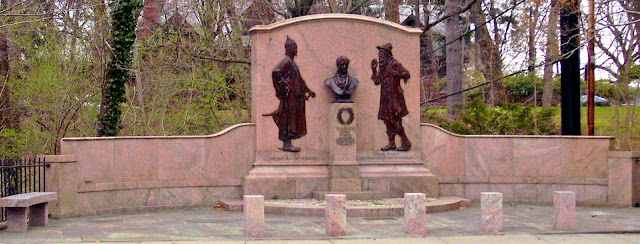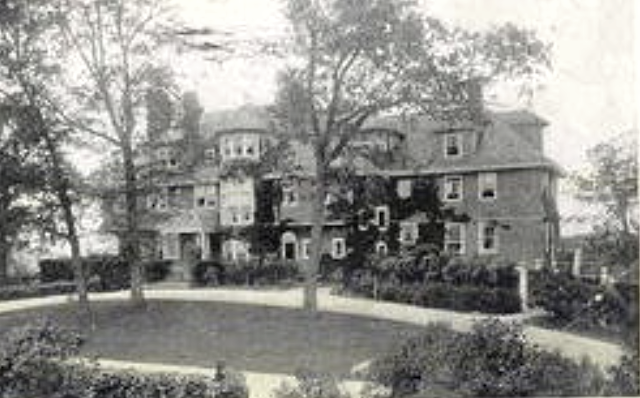Fernheath: Old home long gone, but residents' influence lives on
Prince, his wife and seven children had moved to Irvington in 1869 when they rented the Malkasten estate at the northeast corner of Sunnyside Lane and North Broadway built by famed Hudson River School artist Albert Bierstadt, a Prussian immigrant, in 1866.
Malkasten — or Paintbox in English — was considered to be part of Irvington at the time but was absorbed into Tarrytown when that village was incorporated in 1870, two years before Irvington’s own incorporation. Malkasten was destroyed by fire on Nov. 10, 1882.
Prince, a descendant of the Elder William Brewster, a Pilgrim who sailed to Plymouth, Mass., on the Mayflower in 1620, was the second President of the Village of Irvington Board of Trustees, a title that equates with mayor today. He was a highly regarded New York City physician who was said to have spent one day a week caring for Irvington residents and either donating his services or charging nominal fees. He was the village’s only physician at the time, according to the Irvington Gazette newspaper.
While owned by the Carpenters, Prince’s eventual home was said to have been visited frequently by famed author Washington Irving, owner of the nearby Sunnyside estate on the banks of the Hudson northeast of Sunnyside Lane.
Prince’s youngest daughter Jennie was a member of the inaugural class of students at The Masters School in Dobbs Ferry in 1877.
She went on to become a well-known music composer and pianist with more than 100 published compositions.
 |
Sheet music for “The Pledge, A Wedding Song” for voice and piano by composer Jennie Prince Black of Irvington remained available in 2021 on Amazon.com. |
When Jennie Prince married printing magnate Henry Van Deventer Black, the couple moved in with Prince in the summers and inherited the house on Prince’s death in about 1890. The Blacks eventually changed the name of their property to Bide-A-Wee, which remained its name until the widowed Jennie Black moved to the 1905-built Hotel Gotham — The Peninsula New York today at Fifth Avenue and 55th Street — in Manhattan after her husband’s death in 1941. The couple had owned a Manhattan brownstone in the 1890s at 57 E. 66th Street, but had sold it in 1900.
Jennie Black discussed her Irvington home on Nov. 16, 1923 at Irvington Town Hall in a speech at a 50th anniversary celebration of Irvington residents of 1873. In the speech, she recalled that the only real difference between Bide-A-Wee then as opposed to 1873 was the loss of a greenhouse on its southern side built by Frederick A. Lord.
The greenhouse was demolished in a hail storm, Black recalled, and on its foundation the family built a music room. The brick house itself, which was located somewhere between what is now 95 and 99 North Broadway today, was demolished in 1943 after Mrs. Black's move to Manhattan.
While both Irvington homes in which she lived are long gone, Jennie Black’s influence is still visible in Irvington today. In 1909, the 50th anniversary of the death of renowned author and village namesake Washington Irving, she began organizing a movement to recognize Irving in the village. Eighteen years later, her fundraising and organizational efforts paid off with the dedication of the $43,500 Washington Irving Memorial at the southwest corner of Sunnyside Lane and North Broadway.
The monument stands on land once owned by Irving and near the brook he immortalized in “The Legend of Sleepy Hollow.” It features a bust of Irving flanked by sculptures of two of his most famous literary characters, King Boabdel and Rip Van WInkle.
It was dedicated on June 26, 1927 by his great-grandnephew, Pierre Washington Irving, son of Mr. and Mrs. Louis DuPont Irving, who were living at the late author’s Sunnyside estate at the time.
The sculptor was Daniel Chester French, who also sculpted the iconic Abraham Lincoln statue in the Lincoln Memorial in Washington, D.C.
The Irving memorial has been listed on the National Register of Historic Places since 2000.
In its Sept. 27, 1945 edition, The Irvington Gazette eulogized Jennie Prince Black:
“In the passing of Jennie Prince Black, another of the ties that bound the Irvington of today to the Irvington of another era has been broken. For a community that she loved from the bottom of her heart and for whose welfare she was ever alert, her loss is not a small one.
“It is fortunate, however, that Mrs. Black was endowed with a gift that made it possible for her to transfer to paper her impressions of the Irvington that she knew in the days just following the time of Washington Irving, and through her little [1938] volume entitled I Remember, her Irvington will live through the years.
“To Mrs. Black, perhaps more than to anyone else, is Irvington indebted for the memorial to Washington Irving which stands at Broadway and Sunnyside Lane “on land which was once owned by Washington Irving” as she so often said in bemoaning the fact that Sunnyside as a result of political maneuvering was brought within the corporate bounds of Tarrytown instead of within the limits of the village to which Irving gave his name.
“This tribute to her memory is but a feeble effort to honor her as she should be honored.”
 |
Henry (Harry) Van Deventer Black and Jennie Martense Prince Black of Irvington are interred in this grave in western Brooklyn’s Green-Wood Cemetery. * Click here for links to other Gilded Age stories by this author |











Comments
Post a Comment
If you would like to weigh-in, feel free ...